Zuqualla Horti PLC is a farm located in Ethiopia, active in strawberry and ornamental cuttings production. They are now adopting gutter systems for hydroponic strawberry production and will host open days in September to showcase their latest developments.
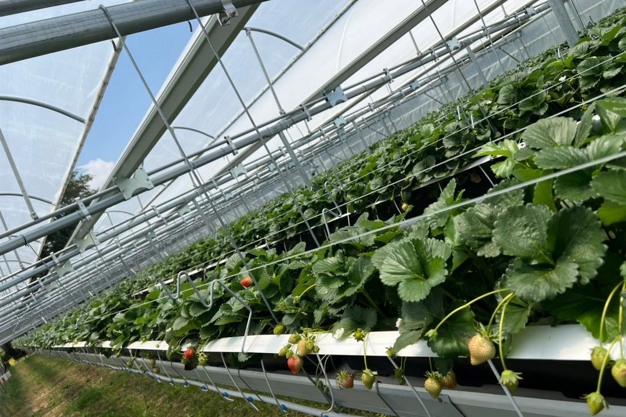
Their vision is to be able to offer strawberries throughout the year, for different geographical markets. "With no real peak like what you see when growing outside 80 days after planting, but rather equal cycles of 6 months, we can plan better regarding market supply, labour and other costs," Wout van Koppen, general manager of Zuqualla Horti PLC, says.
"We are happy to contribute and share our techniques with other Ethiopian growers, government officials and students so we can improve the horticulture industry in general. We want the private sector to visit the 16th and reserve the 17th more for government officials."
During the field days, the Zuqualla team, Meteor Systems, and Flevoplant will show the visitors the new greenhouse and explain to them all the system's advantages and the importance of investing in new technology in general.
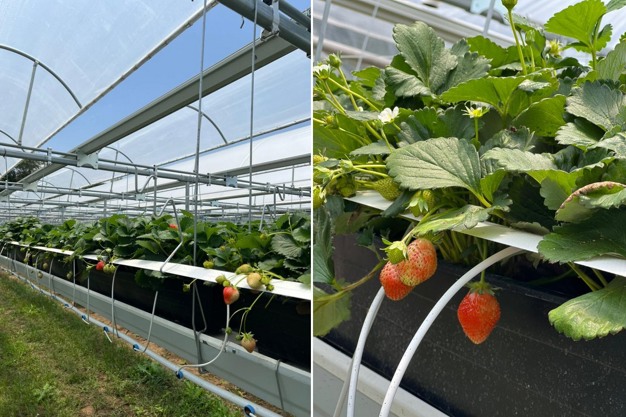
Flevoplant is specialized in strawberry propagation and breeding with their "Flevo Berry" range. For Zuqualla they play an important role within the Ethiopian context because they breed varieties that are resistant to powdery mildew.
"Having resistant varieties enables us to solely use IPM in our greenhouses which is a big environmental bonus. Growing hydroponically also makes it much easier to control your population of insects", Wout states.
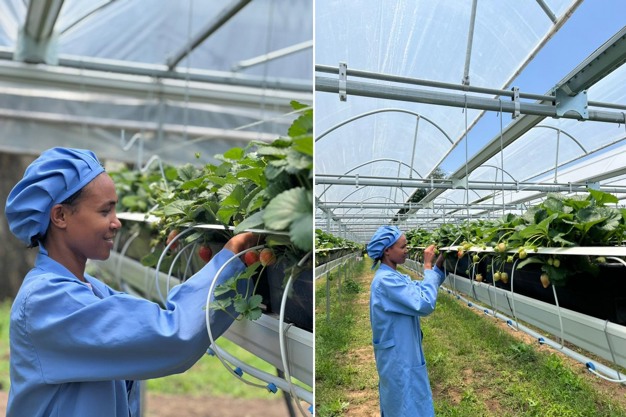 Visible ergonomic advantage during harvest
Visible ergonomic advantage during harvest
Demo greenhouse
The facility is equipped with a hanging growing system, drip irrigation and a Mini-Air tunnel, developed by Meteor Systems. "Our Mini-Air tunnel and suspended growing solution have big ergonomic advantages as they do not require bending down during harvest. Our labourers can pick while standing", Wout says.
"We have experience with gutters from using them with our cuttings. In the cutting greenhouses, we have different types of gutters where we grow hydroponically in pots. The media that we use is volcanic ash, which is locally available here. It is the same media we also use for the strawberries. We also have experience with collecting wastewater; in our irrigation house, we have an Ozone system from AgroZone in Holland, recycling the wastewater. The Ozone system makes sure all the bacteria and viruses are killed so we can reuse the wastewater. This enables us to save about 30% of our fertilizer consumption, making it better for the environment. Using this experience and Ozone treatment, setting up the strawberry greenhouse is easier and applies the same methods."
Save and re-use
According to Wout, their Meteor Greenhouse has a lot of advantages above traditional open-field strawberry production. "We expect higher yield, need to use far less labour, it is much easier for IPM to be implemented, we can re-use all our wastewater and we can plant any time of the year. We could normally plant only until the rainy season ends, which is September, but now we can plan more evenly throughout the year."
Growing in greenhouses enables you to not have the normal November to January big flush but rather a more evenly spread yield over the year. This ensures fewer seasonal workers and more permanent workers, which indirectly leads to improved quality products as permanent workers are always better trained.
"We also grow grass on the floor to create a good microclimate in the greenhouse under the gutters with a separate sprinkler line attached at the bottom of the gutters." The movable sides of the greenhouse are all connected to their Priva computer. "We need to see if we can maintain higher temperatures during the night and if these two different aspects are adding towards this", Wout states.

Climate and business in Ethiopia
The Emsflower Nursery, owned by the Kuipers family, invested in Zuqualla Horti PLC four years ago to expand their strawberry and cuttings business. Specifically, chrysanthemums, osteospermums and geraniums are unique as this area is ideally suited for them.
The climate is suited for both cuttings and strawberries as strawberries have been produced on the 40-hectare farm (with 20 hectares of strawberry fields and 8 hectares of propagation greenhouses) long before the change in ownership. "The combination of higher day temperatures and lower night temperatures at 1650m elevation is ideal, and the location of the farm is just 80km away from Adis Ababa which is great for logistics and exports."
In Ethiopia, there is a shortage of foreign currency. "Half of the export earnings are converted into local currency." That foreign currency remains with the private banks and exporters only receive half. Wout says this makes it difficult to repay the foreign debtors for installations and services during the season. "When you need half of the foreign currency for fertilizers, spare machine parts and IPM for example, there is less foreign currency available to invest further in greenhouses development."
"Luckily our company is a third-generation family company (Emsflower), so they have long term commitment and vision compared to other investors," Wout states.
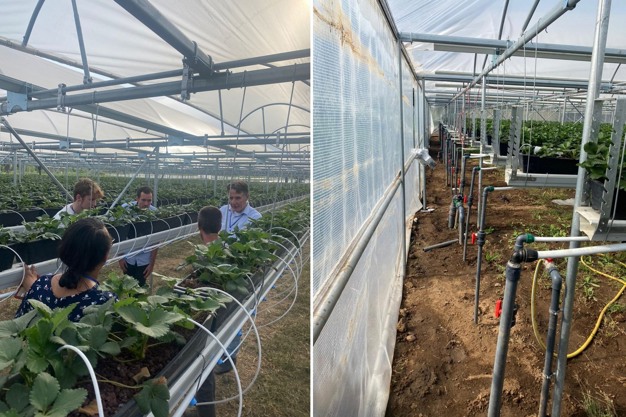
Wout finds it positive that Ethiopian Airlines is very big. "They have easy access and networks globally, which is ideal for exports. It makes the marketing easier because of competitive rates and we can even export easily to smaller markets like Seychelles." They also export to South Africa.
Ethiopia has an export deficit, so anything that can contribute toward exports will help. Challenges driving Zuqualla's innovation apart from access to foreign currency include increased labour costs and high inflation rates (about 30% increases). "We provide our workers free lunch and also transport to and back from work. We cover their medical expenses while living costs increase. So, wherever we can we try to mechanise and automize."
According to Wout, they will not reach the level of automation that you see in Europe for example, but they need to stay competitive with big producing countries and Spain, Morocco and Egypt, who have the advantage of driving by truck where Zuqualla needs to fly their produce out.
Wout and his team are hoping to set a standard in Ethiopia with their demo greenhouse for the next 20 years when it comes to strawberry production. The system is already proven in Europe, so they want Ethiopian systems to improve.
For more information:
Zuaqualla Horti PLC
Wout van Koppen
Email: wout@zuquallahorti.com
Ziway old road, Modjo Town
Ethiopia
Emsflower GmbH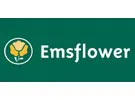
Carl-von-Linné-Str. 1
48488 Emsbüren
Tel: +49 5903 93553 0
info@emsflower.de
www.emsflower.de
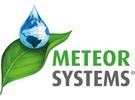
Meteor Systems
Minervum 7081
4817 ZK, Breda
Tel.: +31 (0)76 504 2842
www.meteorsystems.nl
